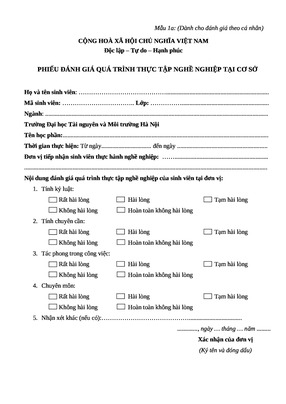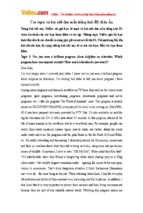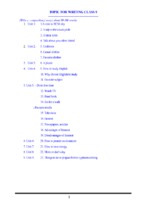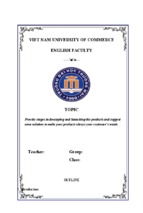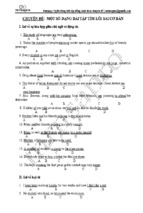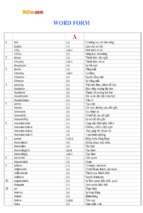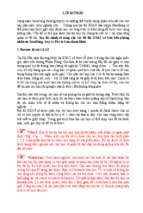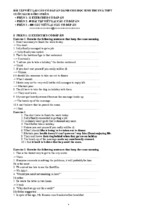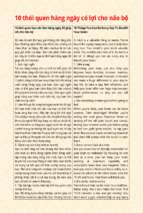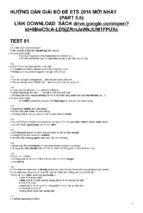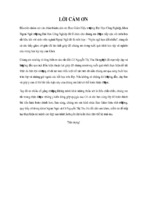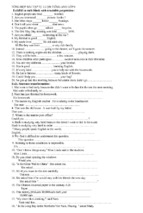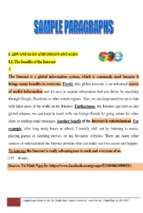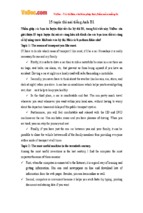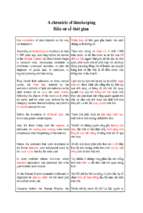Vi Valeria
IELTS Speaking
Chào các bạn, mình là admin fanpage LUYỆN NGHE TIẾNG ANH. Với mong muốn giúp
cho tất cả các bạn đang có nhu cầu trau dồi vốn từ vựng cũng như có tài liệu để luyện nói và
tham khảo 1 số samples, mình đã bỏ chút thời gian tổng hợp lại trong quyển sách này. Các
nguồn mình tổng hợp mình cũng đã ghi rõ. Các bài học được phân thành topics với những
chủ đề rõ ràng kèm theo các từ vựng, idioms, phrases thích hợp cho các bạn luyện tập. Hi
vọng có ích cho tất cả các bạn. :). À đừng quyên chia sẻ quyển sách này cho những ai cần
đến nó nhé ^^ đặc biệt là nhấn like fanpage của mình hén ^^
Admin heo
_ Vi Valeria_
Vi Valeria
IELTS Speaking
Vi Valeria
IELTS Speaking
Speaking Practice Test: Practice Test 1 - Health
Part 1 - sample questions
What do you do to stay healthy?
Is it easy to keep fit where you live?
What do you think is more important, eating healthily or doing exercise?
Do you have a good public health system in your country?
Is there anything you‟d like to improve about it?
Part 2 – sample task card
Describe something you do to keep healthy.
You should say:
what this activity is
when you do it
and how often you do it
and explain why you think it‟s a good way to look after your health.
Part 3 – sample questions
1. What are the most popular ways of keeping healthy in your country?
2. Do you think people worry more about their health as they get older?
3. Why do you think some people continue bad habits when they know that they are damaging to their
health?
4. How can children be encouraged to adopt healthy eating habits?
5. Do you think people have become more health conscious in recent years?
6. Could governments do more to promote healthier lifestyle options?
Useful Vocabulary
Vi Valeria
IELTS Speaking
Healthy activities / habits – things that are good for
your health
a health inspector
health food
taking regular exercise
health insurance
playing sport(s)
healthcare
(going) swimming
(going) cycling
health and safety (rules / regulations /
guidelines)
going to the gym
a healthy lifestyle
doing yoga / pilates / tai chi
a healthy diet
eating fresh fruit and vegetables
a healthy appetite
eating organic foods
a healthy economy
eating regular meals
a healthy bank balance
drinking water
a healthy profit
having a balanced diet
a healthy attitude
a healthy respect
Unhealthy habits – things that are bad for your
health
Verb + Noun Collocations
smoking
to look after your health
binge drinking (excessive amounts of
alcohol)
to take care of our health
to maintain your health
taking drugs
to be in good / poor health
eating too much salt / fat / sugar
to regain your health
being overweight
Verb + Adjective Collocations
Health Collocations
a health farm
a health centre
a health club
a health service
a health risk / hazard
a health check
a health problem
a health visitor
Vi Valeria
to feel healthy
to look healthy
to be healthy
to keep / stay healthy
Useful Linking Expressions
Adding more detail
In (actual) fact, …
Actually, …
IELTS Speaking
More to the point, …
Indeed, …
To be more precise / exact, …
Sample Answer
Qu.6 Could governments do more to promote healthier lifestyle options?
Yes, in my opinion the government has a big responsibility to try to persuade people to live more healthily. I think
they could provide more education in schools to teach children how to eat more healthily and show them the
importance of taking physical exercise. In fact, it‟s the parents too that also need to be re-educated on these issues.
Another thing, I think there should be more government warnings on TV showing people the dangers of obesity and
poor diet, for example. Actually, they do have some that show the health risks of smoking and drinking, which are
quite powerful, but not really about healthy eating. Finally, there could be more public facilities to help people keep
fit, like swimming pools, gyms and sports centres. More to the point they need to be affordable so that everyone has
the opportunity to use them.
Speaking Practice Test: Practice Test 2 - Work
Part 1 - sample questions
Do you work or study?
What do you do for living?
Did you have any difficulty getting your present job?
Do you enjoy your work?
Which part of your job is exciting?
What are the main tasks in your job?
Do you plan to continue/stay in this job for a long time?
Would you like to change this job?
Which is more important – your job or the people you work with?
Part 2 – sample task card
Describe the job you would most like to have.
You should say:
what this job would be
where you would work
which qualifications you would need
and explain why you would like to have this job most.
Vi Valeria
IELTS Speaking
Part 3 – sample questions
1. Which jobs are most respected in your country?
2. Do you think that some jobs are still more suited to either men or women?
3. Do you think schools provide enough advice and support about future careers?
4. What changes have there been in recent years in employment in your country?
5. Do you agree that salaries should reflect the level of contribution to the community that the job makes?
6. Do you think more and more people will work from home in the future?
Useful Vocabulary
Work
to apply for a job / post / promotion
to get / have a part-time/full-time job
to work in [field / place]
to work for [a company]
to specialise in [field]
to be a qualified [job]
to work shifts / unsociable hours
to get / have an interview
to be shortlisted
to be demoted / promoted
to be transferred / to put in for a transfer
to be fired / sacked / dismissed
to be made redundant
to retire / to be retired
to get a pension
the perks of a job (benefits)
to work from home (home-working)
to be self-employed / to work for
yourself
to work / do flexi-time / overtime
Useful Linking Expressions
Sequencing ideas
firstly / first of all, …
secondly, …
thirdly, …
then …
another point / reason / example is …
lastly / finally, ….
overall, …
Sample Answer
Qu. What changes have there been in recent years in employment in your country?
I think there have been many changes in the types of jobs that people do nowadays compared to 20 or 30 years
ago. First of all there are much fewer jobs related to heavy industry such as mining or ship-building or even
manufacturing. Secondly, there has been a big increase in the number of jobs in the service and leisure industries like
shops, gyms, and hotels. And finally, since the launch of the internet there has been a big surge in the number of jobs
related to IT, such as web development and design.
Vi Valeria
IELTS Speaking
Speaking Practice Test: Practice Test 3 - Travel
Part 1 – sample questions
Which form of transport do you usually use?
How do you prefer to travel on long journeys?
Do people use public transport where you live?
What are the benefits of public transport?
Are there any problems with public transport?
Part 2 – sample task card
Describe an interesting journey you have been on.
You should say:
where you went
how you travelled there
who you went with
and explain what was so memorable about the journey.
Part 3 – sample questions
1. What methods of transport are most popular in your city / country?
2. What are some of the problems of long-distance travelling?
3. Has the way people travel changed much in the last few decades?
4. Do you agree that governments should do more to encourage greener methods of transport?
5. What measures could be taken to reduce problems of congestion in cities?
6. Do you think that transport problems are worse in urban or rural areas?
Useful Vocabulary
Popular methods of transport in cities
by metro
by tram
by bus
Vi Valeria
by motorbike / scooter / moped
by bike
on foot
to go by bus
IELTS Speaking
to catch the metro
to take the tram
road access charges in city centres
to go on the motorbike
bypasses / ringroads
to cycle
park and ride schemes
to walk
free rental of city bikes
more cycle lanes
more frequent buses
cheaper public transport
more pedestrianised streets
more electric trams
more accessible metro system
Other methods of transport
by plane
by train
by coach
by boat / ferry
Solutions to inner-city congestion
Transport problems
long delays (in airports)
Useful Linking Expressions
lost luggage
Giving examples
cancellations (of flights / trains)
missed connections
traffic-jams / congestion
roadworks / diversions
breakdowns / accidents
pollution
for example
for instance
such as
like / as
another example / way
Sample Answer
Qu. 5 What measures could be taken to reduce problems of congestion in cities?
There are many ways that congestion could be reduced in big cities. In my city, for example, they have introduced a
bike rental system where members can pick up a bike at one point and drop it off at another. It‟s proving to be very
popular and as a result more cycle lanes are also being provided.
Another example, which unfortunately doesn‟t exist in my city, is a park and ride scheme where you leave your car
outside the city in a carpark and then take a free bus into the centre. Another way to prevent people bringing their
cars into the city would be to charge a special fee to access the centre, like they do in London, though I guess this
wouldn‟t be quite so popular with the residents.
Vi Valeria
IELTS Speaking
Speaking Practice Test: Practice Test 4 - Tourism
Part 1 – sample questions
Are there many public or national holidays in your country?
Do you think there are enough public holidays?
Do you like going away on holidays?
Where did you go on your last holiday?
Describe a place you like to go to during your holidays.
What is the most interesting place you‟d like to visit on your holidays?
Part 2 – sample task card
Describe a holiday you would like to go on.
You should say:
what place you would like to go to
how you would like to get there
what you would like to do while you were there
and explain why you would like to go on this holiday.
Part 3 – sample questions
1. Which places in your country do visitors enjoy visiting most?
2. What are some of the benefits of going away on holiday?
3. Have there been any recent changes in the types of holiday that are popular in your country?
4. What kinds of benefits might a significant increase in tourist numbers bring to a location?
5. What are some of the negative effects of a dramatic increase in tourism?
6. What developments affecting international travel might there be in the future?
Useful Vocabulary
Positive aspects of holidays (personal)
chance to unwind
Vi Valeria
spend quality time with family / friends
get away from work / stressful
environment
IELTS Speaking
have a change of routine / scenery
visit new places / experience new things
/ cultures
broaden your horizons
visit family or friends abroad
Negative aspects of holidays (commercial)
can cause overcrowding
tourists may not respect local
customs/traditions
can cause excess of litter / noise
may cause damage to local environment
area becomes too built-up due to
increase of hotels/shops etc
may cause increase in prices of local
services and goods
Positive aspects of holidays (commercial)
creates new jobs in tourist industry
attracts media attention to the resort
ensures good level of infrastructure
improves services for local residents
provides revenue to protect /maintain
local heritage
Negative aspects of holidays (personal)
loss of earnings (if self-employed)
can be stressful (to be out of your
comfort zone)
can be difficult to cope in foreign
country / unfamiliar place
may encounter travel problems
(plane/train delays / traffic jams)
may not be able to speak the local
language
Useful Linking Expressions
Adding more reasons / examples
in addition (to) …
furthermore, …
as well as …
also …
not only … but also
may not have access to health facilities
both … and …
may lose your luggage
besides …
Sample Answer
Qu.2 What are some of the benefits of going away on holiday?
There are many benefits of going on holiday. Besides giving you a chance to unwind and relax, it also allows you to
spend some quality time with your family, not only in a different environment but more importantly, away from the
routine pressures of work and daily life.In addition to this, it also gives you the opportunity to broaden your
horizons by visiting new places and experiencing a different way of life.
Vi Valeria
IELTS Speaking
[Positives of Tourism]
Tourism is a popular leisure activity
People go on holiday to relax and have fun
Tourists can experience different cultures
They can sunbathe on beaches or go sight-seeing
Travelling abroad opens our minds
We can learn to speak other languages
The tourist trade is vital for some economies
It creates employment in services like accommodation, transport and entertainment
Some areas rely on tourism for their income
Tourists spend money
Tourism attracts investment from multi-national companies
It helps to improve the standard of living
Low-cost airlines are making it cheaper to travel abroad
[Negative effects of tourism] Tourism can have a negative effect on the natural environment
The building of facilities and infrastructure can destroy the habitat of wild animals
Beautiful beaches are spoilt by the building of hotels
Tourism creates pollution and waste
It puts pressure on local resources
Local traditional and cultures may be endangered
A rise in the cost of living affects local people
The price of goods, services and housing may increase significantly
[The future of tourism] Government should introduce laws to protect natural environments and local cultures
Tourism should have a low impact on wildlife
Renewable resources like solar or water power should be used
Waste should be recycled
Local businesses such as farms should be supported
( Cô Thùy ED )
Vi Valeria
IELTS Speaking
Speaking Practice Test: Practice Test 5 - The Environment
Part 1 – sample questions
What is the climate like in your country?
Are there any problems with the climate in your country?
What is your favourite type of weather?
What kind of weather do you dislike?
Would you prefer to live in a hot or cold country?
What is the best/worst weather for travelling in?
Part 2 – sample task card
Describe an environmental problem. You should say:
what it is
how long it has existed
how it affects people‟s lives
and explain how you think the problem will develop in the future.
Part 3 – sample questions
1. Which environmental problems are people most concerned about in your country?
2. What are the main causes of these environmental problems?
3. Do you think it is the responsibility of governments alone to protect the environment?
4. What measures can individuals take to protect the environment?
5. Do you think large companies and business orginisations should be more environmentally friendly?
Why? How?
6. How can we teach children about the importance of protecting the environment?
Useful Vocabulary
Environmental Problems
Vi Valeria
destruction of the rainforests
(deforestation)
IELTS Speaking
melting of the icecaps
replanting trees
extinction of many species (loss of
biodiversity)
cutting carbon emissions
cleaner waste disposal
sustainable consumption and
development
destruction of the ozone layer
global warming / the “greenhouse effect”
rising sea levels
buying products with less packaging
pollution of land, sea and air
buying organic products
increase of natural disasters eg,
earthquakes, landslides, floods
buying products made from recycled
material / renewable sources
using natural remedies as alternative
medicine
Causes of Environmental Problems
excessive emissions of greenhouse gases,
eg carbon dioxide
chemical and industrial waste
emissions from cars and planes
improper dumping of household waste
overuse of non-renewable fossil fuels
genetic modification
over-consumption
over-urbanisation
Useful Linking Expressions
Explaining causes
Solutions to Environmental Problems
recycling
using renewable sources of energy, eg
solar heating, wind-farms
caused by
due to
because of
a result of
Explaining effects
leads to
results in
causes
Sample Answer
Qu.1 Which environmental problems are people most concerned about in your country?
I think people in my country are most concerned about future shortages of fresh drinking water, which I suppose is
both a result of poor water management and general global warming. I think everyone is feeling the effects of the
latter problem which is causing us to experience more extreme temperatures, for example, much colder winters and
much hotter summers. The long hot summers are particularly worrying in the south of the country where there is a
real risk of drought due to the consistent lack of rainfall.
Vi Valeria
IELTS Speaking
Speaking Practice Test: Practice Test 6 - Technology
Part 1 – sample questions
Do you use a computer at work or at home?
What do you use a computer for?
Do you like using computers?
When did you learn to use a computer?
What is the importance of computers nowadays?
What jobs do computers do better than people?
Part 2 – sample task card
Describe a piece of technology that you find useful.
You should say:
what it is
what you can do with it
how often you use it
and explain why you find it so useful
Part 3 – sample questions
1. What are some of the main uses of technology for communication?
2. Do you agree that some people use technology for communication too much?
3. What differences are there between the attitudes of older and younger people to technology for
communication?
4. Do you think that the advance of technology has improved standards of education in schools?
5. Would you agree that the rapid development of digital technology has had a positive impact on the
world of work?
6. Do you think that the rate of technological expansion will slow down in the years to come?
Useful Vocabulary
Uses of internet for communication
Vi Valeria
sending emails
IELTS Speaking
sending text messages
online degrees
tele-conferencing
self-access centres / study
video conferencing
online tutor
online chatting
blended learning (online + face-to-face)
social networking
blogging
posting messages on forums
using an intranet system
Advantages
offers immediate communication
cheaper than telephone calls / face-toface meetings
allows global communication without
the need to travel
offers more flexibility for the learner
allows people in rural areas the same
study opportunities
cheaper for students (no travel /
accmmodation costs)
students & teachers are less bound by
time and space
Technology and Work
more convenient / people can
communicate on-the-move
allows friends and family overseas to
stay connected
Advantages
gives everybody the chance to have a
public voice
Disadvantages
people may lose “real” social skills
people may spend less time socialising
face-to-face
automated processes
automated manufacturing
automated customer services
high-tech computer systems
computerised filing / administrative
systems
huge databases
intranet system / internal emailing
Disadvantages
has made some jobs redundant
people may become more introverted
gives customers less personal service
people may become adicted to social
network sites
requires staff to be technically skilled
people spend too much time in front of a
screen
may cause security issues /files may be
lost
requires a lot of investment
breakdowns in the system may cause
severe problems
Technology and Education
interactive whiteboards
e-learning
Vi Valeria
IELTS Speaking
Useful Linking Expressions
Giving reasons
due to (the fact that) …
because of …
because …
as a result of …
… that‟s why …
Sample Answer
Qu. Do you think that the advance of technology has improved standards of education in schools?
I think the growth of the internet has had a major impact on current teaching methods and I‟m sure general standards
have improved as a result. I strongly believe that the motivation for both learning and teaching has
increased because of the phenomenal amount of information now available to both students and teachers. On the
other hand, due to a danger of information overload, some people may be put off using technology in the classroom,
wishing for a return to more traditional methods.
Speaking Practice Test: Practice Test 7 - Free Time
Part 1 – sample questions
How much free time do you have?
How do you spend your free time?
What kinds of things do you like doing in your free time?
Do you prefer to spend your free time alone or with other people?
Do you think people have enough free time these days?
What do you usually do on weekends?
What did you do last weekend?
Do you have plans for the next weekend?
Part 2 – sample task card
Describe a leisure activity you like doing in your free time.
You should say:
what kind of activity it is
how often you do it
what equipment you need to do it
Vi Valeria
IELTS Speaking
and explain why you enjoy doing it.
Part 3 – sample questions
1. What kind of free-time activities are typical in your country?
2. Have there been any recent changes in the types of leisure activities that people fnd popular?
3. Do you agree that it‟s important for people of different ages to do leisure activities together?
4. In your opinion, who is responsible for encouraging children to take up different leisure pursuits –
parents or teachers?
5. Do you think people have less time for leisure activities now compared to the past?
6. Do you think that technology will have a significant impact on the types of leisure activities we will
enjoy in the future?
Useful Vocabulary
Popular Outdoor Leisure Activities
playing / practising / doing sport(s)
rambling / hiking / walking
running/ jogging
cycling
fishing
horse riding
(wind) surfing
(ice) skating
sailing / canooing / kayaking
skiing
snowboarding
skateboarding
hanging out / meeting up with friends
eating out / going to restaurants or cafes
Popular Indoor Leisure Activities
going to the gym / keeping fit / doing
exercise
doing yoga / pilates / aerobics
Vi Valeria
doing martial arts (karate/judo)
swimming
going to the cinema / theatre
playing a musical instrument
acting (amateur dramatics)
dancing (ballet / tap / ballroom / hip-hop
/ freestyle / latin)
singing (in a group / choir)
playing computer games
surfing the internet
cooking
reading
playing board games
doing puzzles
listening to music
Useful Linking Expressions
Natural fillers
I suppose …
IELTS Speaking
I guess …
Er, I‟m not sure …
Let me think …
… like, you know …
Let me see …
… I don‟t know …
Um, well …
Sample Answer
Qu. Do you agree that it’s important for people of different ages to do leisure activities together?
Um … well … I think in some cases it could be important for people of different ages to do leisure activities together.
For example, parents or even grandparents can enjoy doing fun things with their children or grandchildren, like, you
know, things that don‟t require a lot of physical ability such as playing games, reading or cooking. I guess that
sometimes it is very important for older people to do things with younger ones, especially more difficult skills that
need to be taught like … I don’t know … martial arts or playing a musical instrument.
Speaking Practice Test: Practice Test 8 - Entertainment
Part 1 – sample questions
Cinema
Do you like watching films?
What kinds of films do you enjoy?
Do you prefer watching films at home or at the cinema?
Do people go to the cinema or the theatre in your home town?
How often do you watch films / go the cinema?
When was the last time you went to the cinema or the theatre? What did you see?
When you were a child what kind of movies did you like to watch?
Would you like to be in a film / play? Why / why not?
Television
Do you watch much TV?
When do you usually watch TV?
Who do you normally watch TV with?
What kind of TV programmes do you like the most?
Vi Valeria
IELTS Speaking
Do you have a favourite TV programme at the moment?
What TV programmes do you remember from your childhood?
Part 2 – sample task card
Describe a film you found interesting.
You should say:
when you saw this film
why you decided to see this film
what happened in the film
and explain why you found this film interesting.
Part 3 – sample questions
1. Is the cinema a popular form of entertainment in your country?
2. Which do you think is more enjoyable, watching films in the cinema or watching films at home?
3. Do you think that films shown in cinemas should have an educational value?
4. Is it important for governments to support film-making in their countries?
5. Do you think the Internet has already had a big impact on the entertainment industry?
6. In what ways do you think that entertainment media may develop in the future?
Useful Vocabulary
Cinema (advantages)
the thrill of watching something on the
big-screen
can sit in the comfort of your own home
can choose what you want to watch
can flick through the channels
more exciting/intense atmosphere
can invite your friends round
big screen really brings the characters to
life
can watch a variety of programmes
can switch it off if you get bored
able to appreciate the cinematography
can enjoy a night out with friends
the excitement of watching a premiere
screening
Watching TV (advanatges)
Vi Valeria
Film-making
social responsibility to make
educational/informative films
good media for reaching wide audiences
has high impact on the public
IELTS Speaking
- Xem thêm -

